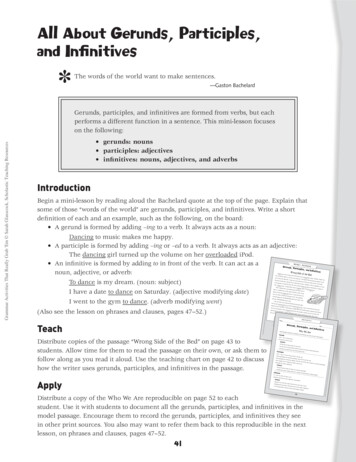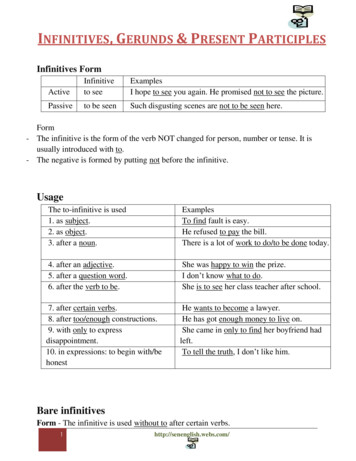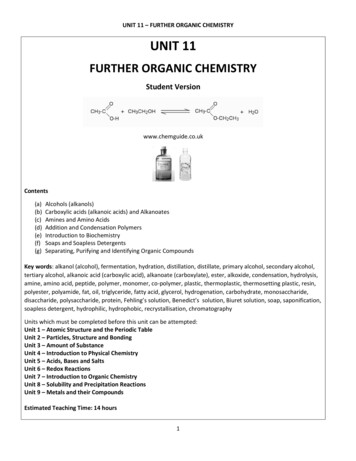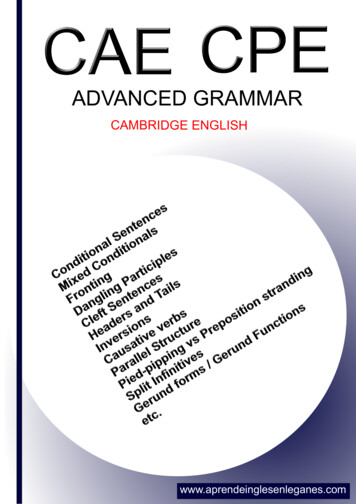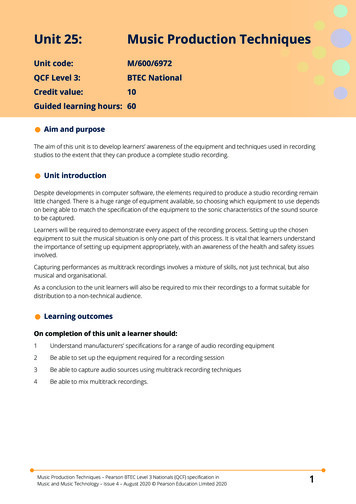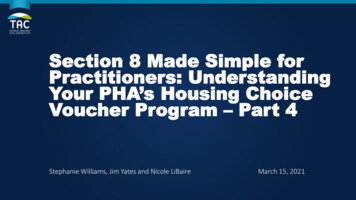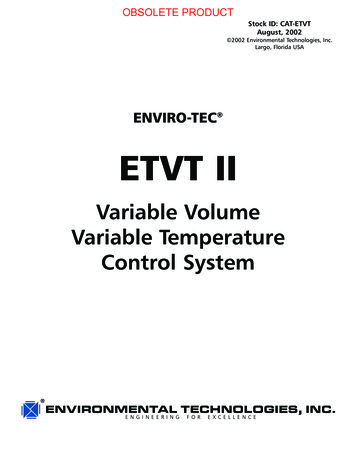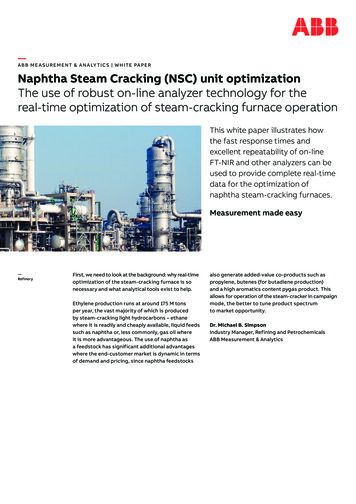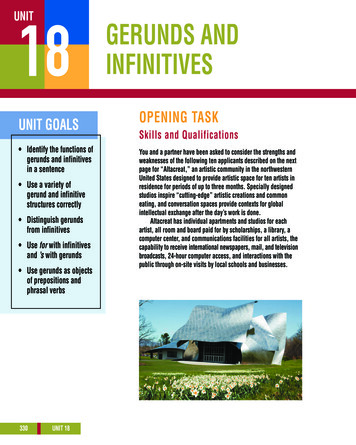
Transcription
UNIT18UNIT GOALS Identify the functions ofgerunds and infinitivesin a sentence Use a variety ofgerund and infinitivestructures correctly Distinguish gerundsfrom infinitives Use for with infinitivesand ’s with gerunds Use gerunds as objectsof prepositions andphrasal verbs330UNIT 18GERUNDS ANDINFINITIVESOPENING TASKSkills and QualificationsYou and a partner have been asked to consider the strengths andweaknesses of the following ten applicants described on the nextpage for “Altacreat,” an artistic community in the northwesternUnited States designed to provide artistic space for ten artists inresidence for periods of up to three months. Specially designedstudios inspire “cutting-edge” artistic creations and commoneating, and conversation spaces provide contexts for globalintellectual exchange after the day’s work is done.Altacreat has individual apartments and studios for eachartist, all room and board paid for by scholarships, a library, acomputer center, and communications facilities for all artists, thecapability to receive international newspapers, mail, and televisionbroadcasts, 24-hour computer access, and interactions with thepublic through on-site visits by local schools and businesses.
STEP 1In pairs, jot down ideas about why you think each person in the chart that follows might like tobe a candidate. Think about why he or she would want to be part of the center and what positiveskills or characteristics he or she could bring. The first one has been done as an example.CANDIDATERATIONALEComposer: Female, wife of architect, Korean, 25 years oldSpecialization: classical pianoPlaying the piano could entertain and inspirethe other artists to design better creations.She might also want to co-design with herhusband (if he is also selected) modern pianostudios for home and commercial use.Architect: Male, husband of piano composer, Japanese,35 years oldSpecialization: modern styles mixed with very traditionalNovelist: Female, Hungarian, 40 years old, married, expects tohave a baby in one monthSpecialization: novels about gypsies in EuropeOpera Singer: Female, Russian, 32 years old, singleSpecialization: dramatic, passionate roles in Italian operasScreenplay Writer: Female, wife of filmmaker, 39 years old,American (U.S.)Specialization: detective mysteriesFilmmaker: Male, husband of screenplay writer, 60 years old,MexicanSpecialization: love storiesPoet: Male, 28 years old, Vietnamese, widowedSpecialization: effects of technology on everyday lifeLandscape Architect: Female, 23 years old, Brazilian, singleSpecialization: sunken gardensArtist: Female, 36 years old, Turkish, marriedSpecialization: geometric mosaicsDigital Artist: Female, 28 years old, Chinese, singleSpecialization: collecting photos from Webcams and arrangingthem in displaysSTEP 2Share the results of your brainstorming with your classmates.GERUNDS AND INFINITIVES331
formFOCUS 1Overview of Gerunds and InfinitivesEXAMPLES(a) Speaking English is fun.(b) To compose a sonata would take months.(c) It would take months to compose asonata.332EXPLANATIONSInfinitives (to verb) or gerunds (verb -ing)can have various functions in a sentence:Subject: Gerunds and infinitives can functionas subjects. However, it is more common forinfinitives that are subjects to move to the endof the sentence with it as the new subject.(d) His dream was to direct the ultimateMexican love story.(e) Her hobby is weaving baskets.Subject Complement: A subject complementfollows be and refers back to the subject of thesentence.(f ) I don’t understand the need to take aten-minute break.(g) The instruction to wear safety goggleshas saved many people’s eyes.Noun Complement: Noun complements explainthe nouns that they refer to. The infinitive canbe a complement to certain abstract nouns (forexample, advice, decision, desire, fact, opportunity,order, plan, possibility, proposal, request, refusal,requirement, suggestion, way, wish). (See Unit 21,Focus 1, for a more extensive list of abstractnouns.)(h) I am sorry to inform you of the delay.(i) They were pleased to meet you.Adjective Complement: Certain adjectives can befollowed by infinitives. These tdetermined(j) Paco hopes to see the play.(k) Carol remembered mailing the package.Direct Object: A direct object follows a verb.Depending upon the verb and accompanyingmeaning, the object may be an infinitive or agerund.(l) By studying hard, you can enter agood school.(m) Thank you for helping me.(n) NOT: He lost the deal because of waittoo long.Object of Preposition: Gerunds, not infinitives,are objects of prepositions.UNIT 18
EXERCISE 1Read the following text and underline all gerunds and infinitives. Then identify thefunction of each one (subject, subject complement, noun complement, adjectivecomplement, direct object, or object of preposition).(1) Alan Loy McGinnis in his book Bringing Out the Best in People (AugsburgPublishing House, Minneapolis, 1985) describes 12 important principles or rules forhelping people to perform to the best of their ability. (2) The first rule is to expect thebest from the people you lead. (3) A true leader needs to drop the role of “watch-dog”and to display a positive attitude toward everyone who works under him or her. (4) Thesecond principle is to make a thorough study of the other person’s needs. (5) Walking amile in another person’s shoes will allow a leader to truly understand someone he orshe is working with. (6) The third rule is to establish high standards of excellence.(7) Many people have never learned the pleasure of setting high standards and livingup to them. (8) The fourth rule is to create an environment where failure is not fatal.(9) People who expect to succeed all of the time often cannot rise from a failure.(10) An effective motivator needs to know how to help people deal with their failure.(11) “Climbing on other people’s bandwagons” is the fifth principle that McGinnissuggests. (12) A good leader needs to identify the beliefs and causes of the people thathe or she works with. (13) By using these good ideas, he or she can encourage themto pursue as many of these goals as possible. (14) Employing models to encouragesuccess is the sixth rule. (15) Everyone loves hearing about true success stories ofothers to build confidence and motivation. Recognizing and applauding achievement isthe seventh rule. (16) A good leader tries to look for strengths in people and catch them“doing something right” so that he or she can compliment them.(17) The eighth rule is to employ a mixture of positive and negative reinforcement.(18) Using praise is only one of many methods used to motivate. (19) Sometimes aperson does his or her best because he or she is afraid to be punished. (20) The ninth andtenth rules relate to appealing sparingly to the competitive urge and placing a premiumon collaboration. (21) Some competition is good; however, the decision to work withother people creates good morale and allows the job to be completed more efficiently.(22) The eleventh principle is to learn how to deal with troublemakers in a group.(23) A leader who does not learn how to handle a problematic person will never learnhow to stay in difficult situations and solve them. (24) Finally, the twelfth rule is to findways to keep the motivation of the leader, himself or herself, high. (25) Renewing oneselfthrough sports, reading, going to a restful spot, etc. are all necessary for the good leaderto become energized and to successfully perform the other eleven principles.Which functions of gerunds and infinitives are most common in this selection? Is the“to-verb” structure always a complement? What other meaning can it have? (Hint:Review sentences 15 and 18.)GERUNDS AND INFINITIVES333
formFOCUS 2Infinitives and Gerunds inPerfective, Progressive, and PassiveEXAMPLESEXPLANATIONS(a) Eva’s plan has always been to return toher homeland.simple infinitive(to verb)(b) She hoped to have earned an Olympicgold medal by the time she was 20.perfective infinitive(to have past participle)(c) Their goal is to be working by March.progressive infinitive(to be present participle)(d) We wanted to have been swimmingby now.perfective progressive infinitive(to have been present participle)(e) The suggestion to be seen by a surgeonwas never followed.passive infinitive(to be past participle)(f ) They were happy to have been chosenfor the award.perfective passive infinitive(to have been past participle)(g) Part of the problem is not knowingenough.simple gerund(verb -ing)(h) She was excited about having watchedthe race from start to finish.perfective gerund(having past participle)(i) Being appointed to the board ofdirectors is a great responsibility.passive gerund(being past participle)(j) Having been selected for the experimentgave her career a boost.perfective passive gerund(having been past participle)EXERCISE 2With a partner, discuss the following topics using infinitives and gerunds. Use theappropriate simple, perfective, progressive, or passive form and give reasons for yourresponse for each item.Example: a movie you enjoyed seeingI enjoyed seeing “Star Wars I” because I like science fiction.1. a holiday food you like to eat2. a present you would like to be surprised with334UNIT 18
3.4.5.6.7.8.9.10.a sport you enjoy playinga place you are excited about having seenanother name you would like to have been nameda job you would like to be doing right nowa famous person in history you would like to have meta topic you would like to have been studying by nowa story you liked being told as a childa feeling you had after having been recognized for somethingEXERCISE 3A woman received a 1000 prize for winning a short-story writing contest. Heracceptance speech appears below. Fill in the appropriate gerund or infinitive. Insome cases, more than one answer may be correct.It is a great honor (award) to be awarded this generous prize tonight.(1)(present) an award for something that I enjoy doinganyway thrills me. (2)(say) that I am indebted to my parentswould be an understatement. (3)(have) parents who weretrained as teachers gave me an important start. From the time I was very young,(4)(study) four hours every day after school was required. Itwas a frequent sight (5)(see) my siblings discussing mainpoints and rehearsing the answers to problems. (6)(scold) byour parents for not paying enough attention to our work would have been the greatestshame.Besides doing my homework for school, (7)(read) fictionand nonfiction books took up much of my leisure time. (8)(read) so many types of books by the time I got to college proved to be a marvelousadvantage. (9)(see) so many good written models allowed meto creatively and effortlessly produce my own work for my university English classes.Today, it requires more discipline for me (10)(be) a goodwriter. (11)(marry) with three children leaves less time to write. Itrequires initiative (12)(arise) every day at 5:00 A.M. to write.(13)(write) in this manner is the only way that I have beenable to produce several short stories and a few poems. (14)(not receive) very good marks on my essay pieces in college, I have left essay writingto some other writer! Well, I can see that my time is up. It has been an honor(15)(select) as the winner of this contest and I thank myparents, family, and all of you for your recognition today.GERUNDS AND INFINITIVES335
EXERCISE 4Fill in the following blanks with appropriate infinitives. More than one answer may bepossible.Example: The requirement to wear a spacesuit is an essential rule for the astronaut to follow.1. Few people have made the decisionan astronaut.2. The proposalexpendable rockets with rockets that couldreturn to Earth saved a great deal of money for the taxpayer.3. The space program strictly heeded the advicethe astronauts for18 days after their flight to the Moon in order to assure their good health.4. The suggestiona “moon base” would allow much usefulscientific research.5. A precautionafter every spaceflight includes isolating lunarsamples until the scientific team is satisfied that no risk of contamination remains.6. The decisionspace-walks occurred in 1964 with ProjectMercury.7. The first wordsby Neil Armstrong as he stepped on to thesurface of the moon were “That’s one small step for a man; a giant leap for mankind.”8. The next challengeis a mission to Mars.EXERCISE 5With a partner, take turns asking and answering the following questions. Use anadjective complement in each of your responses.Example: What are you bound to do after you finish your schooling?I am bound to get a job as a computer technician.336UNIT 18
1.2.3.4.5.6.7.8.9.10.What type of food are you hesitant to eat?What are you apt to do in the next few weeks?Which clubs here or in your native country are you eligible to join?What sport are you reluctant to try?What movie are you likely to see in the next few weeks?Which country would you be delighted to visit?Which student in your class is most liable to be successful?What are you sure to do after your class today?Which friend are you most happy to know?What movie star or musical star would you be ready to meet?meaningFOCUS 3Gerunds versus InfinitivesCertain types of verbs (verbs of emotion, verbs of completion/incompletion, and verbs ofremembering) can be affected by the choice of infinitive or gerund.EXAMPLESEXPLANATIONS(a) To eat too much sugar is not healthy.(b) Eating too much sugar is not healthy.Infinitive and gerunds as objects and subjectssometimes have equivalent meanings.(c) ACTUAL: For the time being, I preferbeing a housewife.(d) POTENTIAL: When my children aregrown, I would prefer to get a job outsidethe home.(e) ACTUAL: Playing golf every day is boring.(f) POTENTIAL: To play golf every daywould be my idea o
gerund and infinitive structures correctly Distinguish gerunds from infinitives Use forwith infinitives and ’swith gerunds Use gerunds as objects of prepositions and phrasal verbs 27520_Unit18_p330-351 pp4.qxp 4/17/07 7:19 PM Page 330. STEP 2 Share the results of your brainstorming with your classmates. GERUNDS AND INFINITIVES 331 STEP 1 In pairs, jot down ideas about why you .
